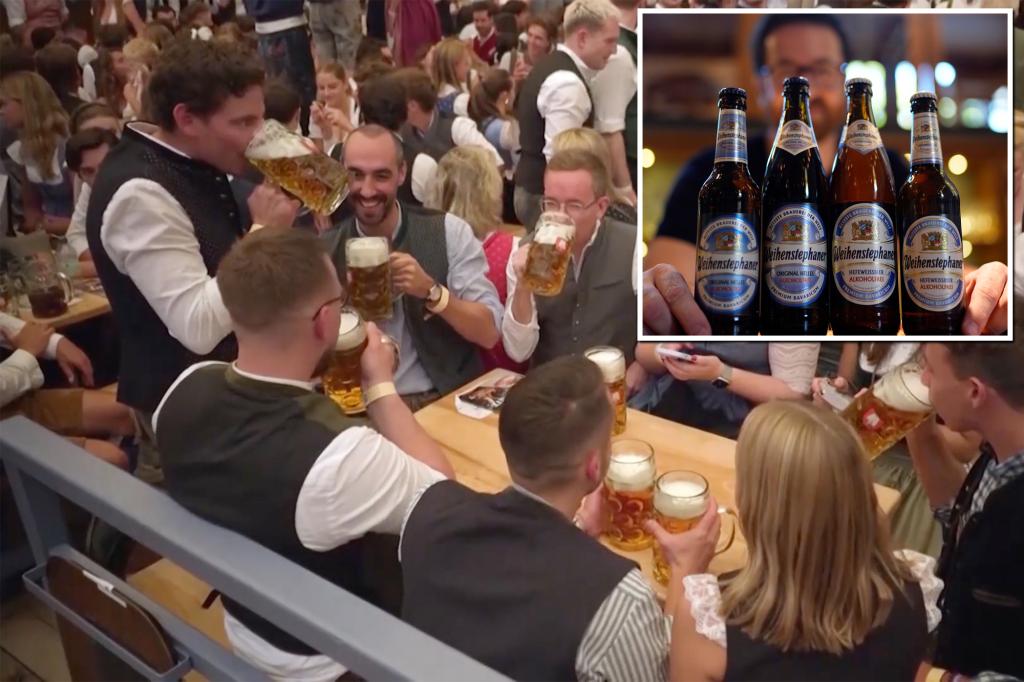Alcohol-free beer is gaining popularity in Germany, with the head brewmaster for Weihenstephan, the world’s oldest brewery, admitting that he enjoys it during lunch or while working. Weihenstephan has been making non-alcoholic beer since the 1990s, and it now accounts for 10% of their total volume. This increase in consumption mirrors the overall trend of declining beer consumption in Germany. At Oktoberfest, the world’s most famous beer festival, alcohol-free beer is also being offered in most of the large tents, giving attendees a sober option that does not result in a hangover.
The shift towards alcohol-free beer is seen as a response to declining beer consumption, with more people looking for options that allow them to enjoy the taste of beer without the negative effects of alcohol. At Weihenstephan, the goal is to offer a non-alcoholic alternative that still captures the crisp and fresh taste of their traditional beers. Even at Oktoberfest, where alcohol is typically the focal point, attendees are embracing alcohol-free beer as a way to have fun without the repercussions of drinking alcohol.
The popularity of alcohol-free beer is evident in the opening of “Die Null,” the first alcohol-free beer garden in Munich, which served non-alcoholic beer and other alcohol-free drinks during the summer. The availability of alcohol-free beer at events like Oktoberfest is viewed as a positive option for those who prefer not to drink alcohol but still want to participate in the festivities. Customers have shown a preference for the quality of non-alcoholic beers, with researchers developing special hops varieties specifically for use in alcohol-free beer to maintain the distinct aroma and taste associated with traditional beers.
The demand for alcohol-free beer is being driven by a shift in consumer preferences towards more health-conscious choices. Non-alcoholic beers tend to have fewer calories than traditional beers and are often viewed as a healthier alternative to sugary soft drinks. As more breweries introduce alcohol-free options, consumers have a wider selection of non-alcoholic beverages to choose from. The availability of alcohol-free beer at events like Oktoberfest provides an inclusive atmosphere where attendees can enjoy the festivities without feeling pressured to drink alcohol.
Alcohol-free beer is considered a viable choice for those who do not wish to consume alcohol while still enjoying the taste and experience of drinking beer. The market for alcohol-free beer is growing, with breweries adapting to consumer demands by developing high-quality non-alcoholic options. At Weihenstephan and other breweries, the production of alcohol-free beer has become a significant part of their business, reflecting the changing trends in beer consumption. As more people seek health-conscious alternatives, the popularity of alcohol-free beer is expected to continue to rise.
Overall, the acceptance and popularity of alcohol-free beer at events like Oktoberfest indicate a shift in consumer behavior towards more mindful drinking habits. With the availability of high-quality non-alcoholic beers, consumers have greater flexibility in choosing beverages that align with their preferences and values. The rise of alcohol-free beer reflects a broader trend towards health and wellness, where individuals are seeking alternatives that allow them to enjoy their favorite beverages without the negative impacts of alcohol consumption. As the market for alcohol-free beer continues to grow, breweries are likely to expand their offerings to cater to a diverse range of consumer preferences.


